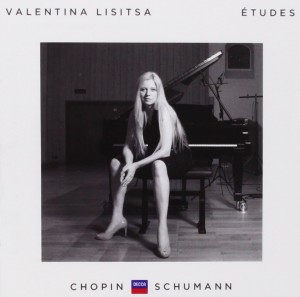Chopin’s Etudes are something of a calling card for Valentina Lisitsa. Shortly after releasing a DVD version in 2007 the pianist began to upload selections online, resulting in more than one million hits worldwide, and an unprecedented YouTube following. Seven years later she returned to the scene of the crime, so to speak, and rerecorded the etudes for Decca, with generally faster tempos, suaver phrasing, and plenty of critic-provoking audacity.
Indeed, Lisitsa’s Chopin Etudes are among the most purely “entertaining” since Cziffra’s Philips versions from more than half a century ago. Her right-hand arpeggios in Op. 10 No. 1 sport similar gypsy-like speed-up/slow-down phrasing, albeit not to Cziffra’s lurching extremes. Op. 10 No. 2’s evenly spun 16th notes are supported by the left hand’s bottomless pit of inner voices and novel accentuations. Lisitsa tumultuously slams through Op. 10 No. 3’s central episode, possibly to make up for her relatively pallid outer sections. Op. 10 No. 4 may not be so intensely driven in the manner of Richter, yet Lisitsa’s lightning reflexes and supple point-making are bound to disarm even the most persnickety piano critic.
The Op. 10 No. 5 “Black Key” etude is brisk and vividly detailed, yet I’m surprised that Lisitsa broaches the final descending octaves so gingerly and mechanically. She holds back in Op. 10 No. 6, and is a touch overloud in Op. 10 No. 7 (one can imagine a lighter dispatch of the right hand’s alternating thirds and sixths). By contrast, Op. 10 No. 8 is glib and scatterbrained, with a prolonged opening trill and a big ritard on the final four chords. The delicacy and control she brings to Op. 10 No. 11’s difficult rolled chords somewhat justifies her swan-dive rubatos. Despite a few small rhythmic mistakes, Lisitsa makes the most of the Op. 10 No. 12 “Revolutionary” etude’s dynamic contrasts and sweeping gestures.
Since many young pianists plod through the Op. 25 No. 1 “Aeolian Harp” etude, it’s refreshing to hear that Lisitsa, like Cortot, feels the music in two beats to the bar. Subtle rubato illuminates Op. 25 No. 5’s textural shifts, while the pianist almost throws away the Op. 25 No. 6 Etude in Thirds, projecting the celebrated double notes with muted understatement, in contrast to the more firmly etched Op. 25 No. 8 sixths.
An animated and intensely inflected duet emerges in one of the best Op. 25 No. 7 recordings I’ve ever heard. Op. 25 No. 10’s double octaves fly by more smoothly than many other pianists’ two-handed unisons. The final C minor Op. 25 No. 12 “Ocean” etude contains more rhythmic backbone than the facile Op. 25 No. 11 “Winter Wind”.
Those who sometimes find Schumann’s Symphonic Etudes tedious and square (especially when each and every repeat is observed) will turn with relief to Lisitsa’s impetuous nature and novel phrasings. I like the legato treatment of Etude IV’s canonic block chords, the giddy lilt of Etude V’s dotted motive, and how the pianist races through Etude VI, uncluttering it in the process. Her headlong tempo and shifts in voicings also help to minimize the Finale’s long-winded repetitions.
Still, there’s more to the music than what Lisitsa conveys on the surface: I find more depth and poetry in Beatrice Rana’s live performance from the 2013 Van Cliburn Competition released by Harmonia Mundi, while Richter, Pollini, and Thibaudet aim higher and achieve more with their added gravitas, unified tempo relationships, classical reserve, and seriousness of purpose. The sonics are lifelike and realistic from the perspective of a decent back-row concert hall seat, yet are slightly opaque and even harsh at loud moments. Note Decca’s 85:16 total playing time—unusually generous for a single CD.
































